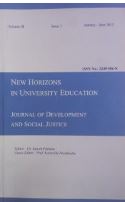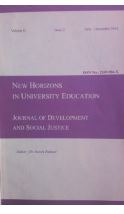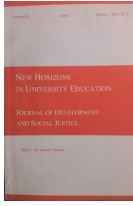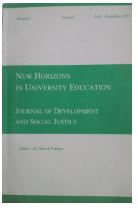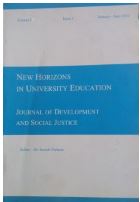NEW HORIZONS IN UNIVERSITY EDUCATION A JOURNAL OF DEVELOPMENT AND SOCIAL JUSTICE
(ISSN 2249-586-X)
New Horizons in University Education is a biannual Journal of Development and Social Justice, published from Centre for Studies in Rural Development – Institute of Social Work and Research, Ahmednagar 414001, Maharashtra. It is a multi disciplinary journal covering areas of social development, human resource management, urban and rural development, social justice, social action, cooperation, micro finance, micro planning, social welfare, social work, welfare administration, family and child welfare, rural health, sanitation, environment, social medicine, community health, etc. Documentation of innovative approaches and indigenous strategies in dealing with social problems in India is the chief objective of the journal. It explores new horizons in University level education incorporating experiences and success stories from various fields of social work. Articles are welcome from the social work practitioners, social work educators, researchers and policy makers regarding various social development, social justice, and social welfare issues.
Editorial Board
Editor: Dr. Suresh Pathare
Members:
- Prof. Sanjai Bhatt, Delhi University
- Dr. Bipin Jojo, TISS, Mumbai
- Dr. Keshav Walke, Nagpur
- Dr. M. Arif, Ahmednagar
- Dr. Jaimon Varghese, BPHES’ CSRD-ISWR
Advisory Board:
- Dr. Pallassana Balgopal, Emeritus Professor, University of Illinois
- Dr. Venkat Pulla, Australian Catholic University
- Dr. Gina Chowa, University of North Carolina
- Dr. Rajneesh Barnabas, Principal, Ahmednagar College
- Dr. M.B. Mehta, Director, IMS, Ahmednagar
Published Issues:
Volume 9, Issue No. 1 & 2, April 2019
- Social Work response to Indian social realities (Editorial) – Prof. Suresh Pathare
- Spirituality for achieving sustainable development goals – a social work perspective – Jaimon Varghese
- Social Justice and Human Rights: Issue of Caste Based Atrocity against Scheduled Castes in Odisha – Dr. M. Baliar Singh
- Tiger-Tribal Conflict: New Field for Social Work Intervention – Dr Keshav Walke
- Best Practices in the Field Practicum; A Reflection on the Experiments Dr. Habeebul Rahiman VM
- Social Group work and Self Help groups: Understanding the connections and context in India – Prof. Suresh Pathare
- (Book review) Gender and Sexuality in IndiaSelling sex in Chennai – Ms. Punita Gupta
Volume 8 Issue No. 1 & 2, April 2018
- Rural Development: Retrospect and Prospects (Editorial) – Prof. Suresh Pathare
- Integrating Participatory Practices in the Development Projects: A Multi Dimensional Analysis of NGOs in Wayanad, Kerala – Baiju Pallicka Vareed
- Developing the Tribals through social Work: Role of Distance Education – Rose Nembiakkim
- Deconstructing the notion of Mothering in ‘Family and Child Centred Social Work’: A case of sex worker mothers – Prachi Patil
- Means and Ends: A distorted approach in field work practice – Pradeep Jare
- Spiritual Social Work – a Strategy for Sustainable Development – Jaimon Varghese
- Empowering Young People through Peer Education: A Pre and Post Test Analysis in an Urban Slum of Delhi – B Mohit Ahuja & Dr. Saumya
Volume 7 Issue No. 1 & 2 Apr. 2017
- Development Practices in Indigenous Social Work (Editorial) – Prof. Suresh Pathare
- Structural Social Work- (E)merging area in Social Work Education and Social Justice: A Perspective from Within” – Pradeep Jare & Pradnya Jadhav
- Quest for Gender Justice – A study on upward social mobility of Scheduled Caste women in Delhi – Jaimon Varghese
- Use of Street Theatre and Social Media in Competency Building of Social Work Students – Yogesh Kudale
- Long way to achieve democratic process: An ethnographic study of Exclusion from Caste Perspective – Pradeep Jare
- ‘Contribution of Missionaries in Educational Development of Dalit in Ahmednagar District’ (MS) – Suresh Mugutmal
- Social Work Intervention in Solid Waste Management Programme (Field Action Report) – Vijay Sansare & Shamuel Waghmare
Volume 6 Issue No. 1 & 2 April 2016
- Building Community Resilience for Sustainable Development (Editorial) – Prof. Suresh Pathare
- Measuring Empowerment as a Primary Outcome of Community-Based Programs: A Case Study of the Comprehensive Rural Health Project in Jamkhed, India – Lavanya Madhusudan and Shobha Arole
- Inclusion of Dalit women through Structural Social Work: Perspective from below – Pradeep Jare
- Sanjoepuram Community Organisation Programme – A Case Study of Faith based Philanthropic Social Work – Jaimon Varghese
- Spirituality and Religious Coping among Older Persons in Mizoram – Jennifer Rohlupuii & V. Jeyasingh
- Building Social Work Professionals through Transactional Analysis Technique – Vijay Sansare
Volume 5 Issue No. 1 & 2 April 2015
- Promoting Social Justice and Empowerment: Addressing Local and Global Challenges (Editorial) – Prof. Suresh Pathare
- Strategies and Approaches to Promote Equality – Supriya A. D’souza
- Pardhi Community: A Journey from Warrior to Warier – Ashok Ohol, SJ
- Justice Withers Away in Neoliberal Era? Analysis from Subaltern Perspective – Pradeep Jare
- Arenas of Social Work Practice with Social Justice Perspective – Anjali Maydeo
- Empowering Women through Self-Help Group for Social and Economic Development – A Case Study – Pushpalatha N & Dr. Ramesh B
- Participation of Youth for Rural Development: A Case study of Baburdibend Village – Vijay Sansare
Volume 4 Issue No. 1 & 2 April 2014
- Vision for Just, Equitable and Compassionate Society (Editorial) – Prof. Suresh Pathare
- Issues and Challenges for Social Work Practice and Education in the 21st Century India – Pallassana R. Balgopal, Ph.D
- Mainstreaming and Inclusion of Dalit Women for Equitable Society through Political Justice – Pradeep Jare
- NGOs Programme in Social Empowerment of Dalits in Gujarat: Relevance for Social Work Praxis – R. R. Patil
- ‘Concerns of Growing Old: A Study of Health Issues among Elderly Women’ – Asiya Nasreen
- The Concept of Goffman’s Total Institution and Institutional Care of Homes for Older People in Sri Lanka – Chandima Jayasena
- Unconditional Self Acceptance: A Review of Emotional Well Being and Stress Free Life – Vijay Sansare
Volume 3 Issue No. 2 April 2013
- Social Justice and Social Development (Editorial)- Prof. Suresh Pathare
- Spiritually Sensitive Social Work: A Mission for Responsive & Compassionate Society – a National Study on Professional Social Workers – Jaimon Varghese
- Honey Bee and Rural Development – Muhammad Arif
- Career Aspiration of Rural Children of Garmunda Village of Western Odisha – Bandana Meher
- Physical and Mental Health of Rural Elderly in the Fast Changing Social Scenario
– Kaushalendra Pratap Singh - Field Work Practice in Closed Settings: Assessment, Placements and Addressing the Challenges (Report) – Vijay Sansare
Volume 3 Issue No. 1 Jan. 2013
Articles
- Nagmani Rao:Social Justice: Minorities and the Fundamental threat
- Johnson J Puthenpurackal: Tradition: Enabling and Disabling Development
- Victor Ferrdo: Decolonizing Development: Illuming the Maya of Progress
- Kamladevi Kunkolienkar: Sri Aurobindo’s Integral Yoga: Inner Freedom and Development
- Robin S Seelan: The tradition and ethos of gifts in Indian cultures: meanings and development
- Aparna Dattatray Kulkarni: Interrelation between tradition, freedom and development in the context of Rita: A central idea from Indian Vedic literature
- Kuruvila Pandikattu SJ: Developmental Paradox: Contemporary Challenges and Responses in the Indian context
Volume 2 Issue No. 2 Jul-Dec. 2012
Articles
- Prashant Choudhary: Social Exclusion of Scheduled Caste Factory Workers in Delhi
- Rambabu Botcha: Mainstreaming of HIV and aids: social work intervention
- Akash Gulalia: HIV/M Tuberculosis Co-Infection in India: An overview of twin epidemic, impact and control strategies
- Archana Kaushik: Self Awareness: A vital skill for effective social work interventions
- Bhoumik Deshmukh: Motivational and Attitudinal Pattern of Tribals towards education and career: A study of Kokna-Kokni tribe in Maharashtra
- Udaya Mahadevan: A comparative training module for social work educators in Chennai region: A report
- Anuradha Patil: Social work intervention with HIV infected women
Volume 2 Issue No. 1 Jan-Jun. 2012
Articles
- Suresh Pathare: Quest for Spirituality and Social Work: Exploring the Connections
- Olga Real Najarro: Sri aurobindo, the concept of spirituality and religion, and its application in mental health and social work
- Suresh Pathare: Religion, spirituality and ethics in social work: exploring the connections
- Mukesh Kanaskar and Shweta Gupta: Urbanisation and philanthropic social work
- Koteswara Raju Penmetsa and Dhana Lakshmi: The philanthropic social work: reaching the un-reached and empowering the vulnerable
- Toli H. Kiba: The Genesis of social work, Christianity, church based social work activities in Nagaland, India
- Dipak Walokar: Corporate social responsibility and social deveopment
- Patil SM, Kakade BK, Karmarkar PP, Kulkarni PK, Patil NB and Hatolkar VB : Exploring Livelihood Avenues in Distressed Vidarbha, Maharashtra, India
Volume 1 Issue No. 2 Jul-Dec. 2011
Articles
- Suresh Pathare: Issue and Challenges in the wake of rural development
- Sanjai Bhatt: 4 WS (water, work, waste and women) in development paradigm: relooking at social work education in 21st century
- Anita H Panot: Inclusion of women in MNREGA: the challenges ahead
- Gandimathi: Addressing environmental concerns in rural development issues –approaches and challenges
- Anuradha Patil: Social work intervention for migrants as a vulnerable group to prevent HIV/AIDS
- Rajeev Lochan Borah: The vulnerable frontier – a study on the impact of HIV/AIDS on rural masses in northeast India with special reference to Golaghat district of Assam
- Sheikh Nazir Jabbar: Misconceptions and social discrimination – a study of HIV/AIDS infected families in Bhosi village of Hingoli district, Maharashtra
- Kaushalendra Pratap Singh: Rural poverty and livelihood: special reference to MNREGA scheme in Uttar Pradesh
Volume 1 Issue No. 1 Jan-Jun. 2011
Articles
- Suresh Pathare: Contextualizing Education for Rural Development Practice in India
- Prof. Hulbe SK: Education for Development and Social Justice
- Dr. Bhoumik Deshmukh, Approaches and strategies to Rural-Tribal Development with Reference to BAIF Initiatives
- Jaimon Varghese: Empowerment of Women Literacy Workers: A Case Study from villages of Haryana
- Baiju PV: Gender Mainstreaming Indices in Development Projects
- Habeebul Rahiman: Profiling the Excluded for Positive Intervention: Glimpses from the Pallapura Experience
- Bipin Jojo: Land Alienation in Vth Schedule areas of Orissa: A case study of Sundargargh District
Guidelines for Writing Articles
- Editorial policy
Covering letter: The covering letter is important. To help the Editors in their preliminary evaluation, please indicate why you think the paper suitable for publication. If your paper should be considered for fast-track publication, please explain why.
Peer review: All papers submitted for publication undergo peer review.
Declaration: Each article should be accompanied with a declaration by all the authors that: they are authors of the article in the order in which listed and the article is original, has not been published, and has not been submitted for publication elsewhere. If the author has quoted more than 500 words / a table / a figure from a published work in the article, a copy of permission obtained from the respective copyright holder needs to be enclosed.
Competing interests and other declarations: All authors are required to declare any conflicts of interest when submitting papers for publication. Declarations of funding sources, a guarantor and a statement of contributorship are also required.
Permissions: All previously published material must be accompanied by the written consent to reproduction of the copyright holder. An acknowledgement of permission should be included at the relevant point in the paper, and a full reference to the original place of publication should be included in the reference list.
Copyright: Authors of accepted manuscripts will be required to allocate copyright to the publisher prior to publication.
2. Types of articles
Research based original articles: From 3000-6000 words. The content of the paper must justify its length. For reports of original investigative work, traditional division into sections is required: summary (maximum 100 words), introduction, methodology, results, discussion, acknowledgements and references. Black and white photographs and line drawings are welcome if they illuminate the text.
Case Study Reports: Up to 4000 words. The contents should be logically ordered, with subdivision into sections including summary (maximum 100 words). Up to five references may be given. Suitable for presenting descriptive studies, a series of cases etc., some field studies, personal experience or individual case reports of particular interest.
- How to submit a manuscript
Only manuscripts submitted via email in word format to csrd.iswr@gmail.com will be considered for publication. All submissions must be in English. Tables and figures may be submitted as separate files, in which case the files should be uploaded in the following order: (1) main text, including title page, abstract and references; (2) tables; (3) figures; (4) supplementary files; and (5) author proforma.
File formats: Text files must be saved in .doc or .rtf format. Other suitable formats include .tif for photographic images and line drawings, .xls for graphs produced in Excel.
- How to prepare a manuscript
Formatting: Manuscripts must be submitted using single line-spaced, unjustified text throughout with headings and subheadings in bold case. Press ‘Enter’ only at the end of a paragraph, list entry or heading.
Fonts: Only Times New Roman, 12 point, single space, with 6 point paragraph space before and no space after the paragraph
Title page: The first page should contain the full title of the manuscript, a short title, the author(s) name(s) and affiliation(s), and the name, postal and email addresses of the author for correspondence, as well as a full list of declarations. Please also include a list of up to five keywords. The title should be concise and informative, accurately indicating the content of the article. The short title should be no more than six words long.
Abstract: A summary of no more than 100 words must accompany all Original Articles and Case Studies. The summary should cover: Background (context and rationale); Methods (type of study and techniques); Results (main numerical data and statistical information); and Conclusions (main objective and verifiable conclusions).
Tables: Tables must be prepared using the Table feature of the word processor. Tables should not duplicate information given in the text, should be numbered in the order in which they are mentioned in the text, and should be given a brief title.
Figures: All figures should be numbered in the order in which they are mentioned in the text. All figures must be accompanied by a figure legend. If figures are supplied in separate files, the figure legends must all be listed at the end of the main text file. Line drawings should be produced electronically and clearly labelled using a sans serif font such as Arial. Graphs may be supplied as Excel spreadsheets (one per sheet). Other line drawings should be supplied in a suitable vector graphic file format (eg .jpg)
All photographic images should be submitted in camera-ready form (i.e. with all extraneous areas removed), and where necessary, magnification should be shown using a scale marker. Photographic images must be supplied at high resolution, preferably 600 dpi. Images supplied at less than 300 dpi are unsuitable for print and will delay publication. The preferred file format is .tif.
References: Only essential references should be included. Authors are responsible for verifying them against the original source material. References should include the names and initials of all authors. Publications for which no author is apparent may be attributed to the organization from which they originate. Punctuation in references should be kept to a minimum, as shown in the following examples:
- Rubin Allen and Rabbie R Earl (2011) Methodology for Social Work Research, New Delhi: Cengage Learning India Private Limited
- Subhedar IS (2001, 2009 Reprint.) Fieldwork Training in Social Work, Jaipur: Rawat Publication
References inside the text should follow the following format
‘Social work camps help the students in understanding the core of rural life, their problems and needs, and help them in preparing a plan for social work practice and community development’ (Subhedar, 2009:156).
Abbreviations: Symbols and abbreviations should be those currently in use. Authors should not create new abbreviations and acronyms.
Units: All measurements should be expressed in SI units.
- Proofs and eprints
Proofs will be sent by email to the designated corresponding author as a PDF file attachment and should be corrected and returned promptly; corrections should be kept to a minimum.
- Author’s copy
Author of each article shall be given two copies of the published journal as complementary.
- Last date of receipt:
Articles may be sent at any time of the year. However, the publication of the journal is twice a year.
- Contact email:
All correspondence related to the journal should be made to kind attention to the editor via csrd.iswr@gmail.com. You may also send an alternate copy to iswrcsrd@gmail.com.
- Screening procedure:
All the articles received shall be subject to preliminary screening in accordance with the objectives of the journal. Each article will also be sent for peer review to a panel of editors and if selected for publication, it shall be informed to the authors via email. The criteria used for reviewing an article are contemporary relevance, contribution to knowledge, originality, clarity and logic in analysis, methodology of research articles, implications for intervention, appropriateness of references and language. All the articles received will be screened and classified theme wise and the eligible ones will be published. The authors shall receive the confirmation of the intended publication of their works within 6 months (after peer review) of the receipt of their articles via email.
- About author
A short profile (maximum 100 words) of the author including author’s qualifications, positions (past and present), place of work and details about previous publications should be given along with the abstract.
Dr. Suresh Pathare
Editor
